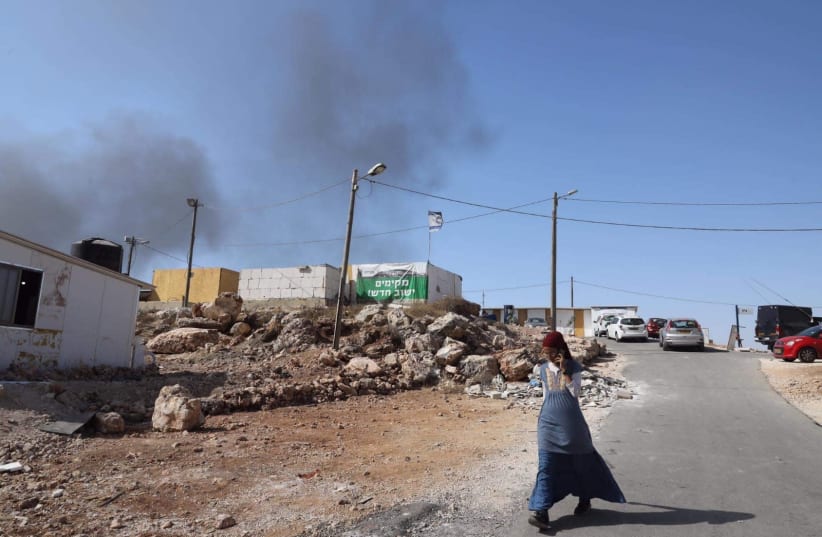Prime Minister Naftali Bennett agreed to advance the legalization of the West Bank outpost of Evyatar as part of a compromise agreement by which the hundreds of settlers and right-wing activists at the site would agree to voluntarily evacuate by 4 p.m. on Friday.
The compromise deal was announced early Wednesday by the Nahala movement and the Samaria Regional Council, which spearheaded the outpost’s construction last month, in the aftermath of the Tapuah junction terrorist attack, which claimed the life of 19-year-old Yehuda Guetta
The scope and the speed of the settlers’ ability to receive a nod of approval for a new settler community on a West Bank hilltop is unusual and represents a victory for the grassroots movement.
Interior Minister Ayelet Shaked hailed it as a “significant achievement” for the settlement of the Land of Israel.
“We have made the right decision for the nation of Israel and the Land of Israel,” Nahala movement head Daniella Weiss said. “The strengths of Evyatar’s residents illuminate the Zionist spirit.”
Samaria Regional Council head Yossi Dagan said he was ultimately satisfied with the agreement.
“The compromise we agreed upon is not the deal of our dreams,” he said. “But each side took steps to meet the other for the sake of Israel in these difficult days when the nation is divided.”
Religious Zionist Party MK Itamar Ben-Gvir warned the settlers they should not trust the Bennett government to stand by the details of the deal.
Fifty-three families have moved onto the site and scores of young adults and teenagers are camped out there. Evyatar residents, together with Dagan and Weiss and with the help of National-Religious rabbis, spent days debating the deal. On Tuesday, they spent eight hours going over the details with Rabbi Haim Druckman.
Nahala coleader Zvi Elimelech Sharbaf said he regretted that the same government that failed to tackle the issue of illegal Arab building had focused all its energies on the destruction of a Jewish settlement.
The only choice before Evyatar, he said, was to accept the deal or allow for the fledgling community to be destroyed. Still, he said, “we believe that this deal will promote Jewish settlements.”
The compromise, which prevented a violent and costly evacuation, drew immediate criticism from the Palestinians and the Left. They slammed the deal, contending that it sanctioned illegal settlement building and appealed to Attorney-General Avichai Mandelblit to invalidate the agreement on legal grounds.
Among those who turned to Mandelblit was MK Mossi Raz, whose Meretz Party is part of the coalition.
“I call on you [Mandelblit] to investigate the construction offenses in the unauthorized outpost, and to hold an inquiry into the conduct of the Civil Administration’s legal professional tier and the steps taken or not taken from the start of the building offenses,” Raz said.
Public Safety Minister Omar Bar Lev (Labor) said “an illegal outpost must be evacuated simply on the grounds that it is illegal. And in a state governed by the rule of law, such factions or others can not be allowed to take the law into their own hands.”
MK Yair Golan (Meretz) said the agreement violated the understanding on which the coalition was based – that the diplomatic situation would remain status quo.
“The creation of additional settlements and the continuation of creeping annexation disrupts that status quo,” Golan said.
He called on Bennett and Defense Minister Benny Gantz to raze any new outposts such as Evyatar.
SETTLERS AND right-wing politicians have insisted the land does not belong to Palestinians, but Palestinians from the villages of Beita and Yatma said it belongs to them.
Beita Deputy Mayor Moussa Hamayel said, “We will continue our popular activities [protests] until the settlement is removed and our land is returned to us.”
The Evyatar deal stipulates that outpost residents have until the end of the week to leave the site, which overlooks Route 505 near the Tapuah junction in Samaria.
The structures placed there will remain and an army base will be immediately set up at the site. The Civil Administration will evaluate within six months the legal status of the hilltop, which is now classified as survey land. Once it has been determined that the hilltop is not private Palestinian property, it will be reclassified as state land.
At that point, a yeshiva will be established at the site and the government will move to legalize Evyatar. It’s unclear if it will be authorized as an entirely new settlement, which is a rare occurrence, or as a neighborhood of the Kfar Tapuah settlement, located on the opposite side of the junction.
Earlier this month, the Samaria Regional Council submitted a master plan for 100 Evyatar homes, which would designate the outpost as a neighborhood of Kfar Tapuah.
This is the second time this week the settlers have announced a compromise deal to evacuate the outpost, but this time around it has Bennett’s consensus.
After the first announcement, Bennett cautioned that the deal was not yet done. The initial arrangement had called for a yeshiva to be placed at Evyatar at the start of August. But Gantz objected to the placement of a yeshiva prior to the classification of the hilltop as state land.
The deal represents a change of heart for Gantz, who had initially claimed the outpost must be removed solely on the grounds that it was an illegal building project of unusually large proportions. He then shifted his position and spoke of his desire to find a way to voluntarily evacuate the outpost.
Even on Tuesday, hours before the deal was accepted, Foreign Minister Yair Lapid indicated that what is “illegal must be taken down.”
